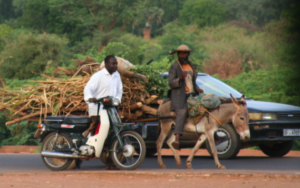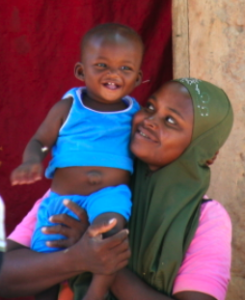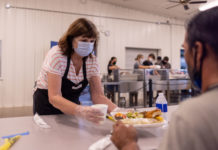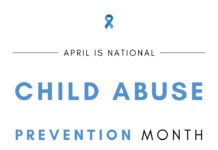
Someone once told me that the Catholic world starts to feel quite small as soon as you meet a person or two. In other words, as you start meeting those working in the Church, you quickly find connections you never thought possible. And you quickly feel at home with each other, like they’re family. Lots of examples of family on this African journey so far:
- The first connection greatly eased my travel worries. I worried slightly up front about the trip because there is trouble in neighboring Mali. We’re really far from that country though. Still, what set my mind at ease was discovering that someone who grew up in a nearby city from me — and close to my age — now works for Catholic Relief Services in Niamey, Niger (our current destination). She’s been here since earlier this year. I figured she’s been safe all this time and I will be too.
- Then there’s my traveling family and the local CRS staff. We spend so much time together that even though we just met five days ago, we’re already comfortable enough with one another to enjoy all kinds of jokes and sit in close proximity for hours at a time. And the CRS staff looks out for us like they’re our parents (especially Caroline, who handled our bartering in the marketplace), making sure we have ice cold water, way too many meals a day, a lender phone and hospitality.
Our drivers are always looking out for us and our bags too, so they can load them in the SUV. Today especially, my driver (it takes three cars per trip) ensured the a/c came out cold after we endured the desert sun.
- Hotel staff is almost just as quick to help unload our bags and take them to our room. One man even turned on my A/C for me. Good thing as I didn’t even think to look for a switch, figuring the service may not be offered. All of this without expecting a tip. It’s just part of their hospitality.
- On the road, I’ve felt at home. Like we’re going to visit family. Essentially we were (and will be for the next week). Every place we’re heading to this week, CRS has maintained an active presence in for five to 10 years and the people in the village have been empowered by their aid. Several visits so far were more like a farewell tour for CRS as multi-year projects just ended. But beyond that, the roads we’ve traveled so far (off and on actual pavement, mind you) felt like trips I’ve taken before.


Roads of Niamey, Niger are shared by cars, motorbikes, people and donkeys alike. Just honk if you want any of them to move and they’ll listen. (Ambria Hammel/THE CATHOLIC SUN) The two-lane highway reminded me of the straight roads between Phoenix and San Diego where there’s nothing but desert on each side. I travel them quite often, so I never felt out of place. The only difference was I don’t pass children on the side of the road nor do I steer around donkey-driven carts on the way to California. There aren’t speed bumps or as many checkpoints either.
When we went off roading — with sometimes narrow squeezes between bushes and trees plus rough, rocky roads — it felt like a trip to see the Poor Clare Nuns of Perpetual Adoration in Tonopah. For those of you who have been there, you know what I’m talking about.
- Despite our vast differences in religion (largely Muslim), daily habits, attire and skin color, I felt right at home in the villages too. Most of them had colorful beach chairs waiting for us. That helped us feel welcome. Crowds gathered around as if we were celebrities. They were interested in our name and who we were with and patiently waited double translations to find out.
There was lots of laughter and lots of smiles, especially when a CRS staff member would shake hands with the children. Even more giggles came each time we showed them a picture of themselves on our digital cameras. The decision also sent flocks of more children our way. Niamey has a very high birth rate. Who hasn’t laughed over a digital photo with their own kids, extended family and friends? I saw a mom look pretty proud when a CRS staff member showed both of them a picture of the pair in her digital camera. It very may well have been their first portrait. The boy was probably less than 5 years old.
-


A Muslim woman plays with her child while the village tells Catholic Relief Services and some journalists Oct. 18 how grateful they are for Cash for Work and food voucher programs. (Ambria Hammel/THE CATHOLIC SUN) The female travelers (there’s three plus up to three other local CRS staff who come along as their schedule permits) seem to routinely notice the moms and kids in the village. Every village swarms with young life, many children still breast feeding. We’ve watched young ones in many villages peacefully fall asleep in their mother’s lap during our meeting. We’ve heard a few slightly fussy ones. We all relate to the experience as moms, aunts and young adults with friends who have kids. We see young kids appropriately afraid of strangers and clinging to and between their mom or dad’s leg. We saw a mom making her infant son laugh by blowing on his tummy.
- The men might relate to the parenting experience too, but I think they were moved more by seeing the two-week old giraffe at an open preserve yesterday. One of our translators was sure to share it with the group and then again in the car in case we missed the fact earlier. We saw the giraffe nurse briefly, check out some strange looking people (to the giraffe’s young perspective) and walk around a bit.
- Even though us travelers are somewhat cutoff from regular modern communication, we still hear the same (sometimes annoying) ringtones in the village and in a small town that we hear in major cities. The village leader’s phone went off today. It sounded like this. Recognize it? Feel at home yet? Now listen to that tune in your head again and place it in this village: one that’s an hour away from the hotel in the open desert as far as the eye could see. Some people might live remote lives — the village was accessible by dirt road and featured no indoor plumbing — but we maintain a desire to stay connected with family.
People in the village were so eager to meet us that they humbly offered to answer our questions until nighttime. They answered what we needed by lunchtime. Catholic Relief Services provided emergency food vouchers and cash for work programs, I believe.
- Then there’s the random connections to people we’ve encountered. Helen, a CRS staff person based in Senegal, ran into a woman she saw on the plane ride over at dinner our second night in town. Both recognized each other and exchanged warm greetings.
Marcy, a CRS staff person who started her position in Niamey six weeks ago, recognized at least two former MercyCorps buddies during our trips out.
Someone who just left her position in our building because her husband was transferred out of state knows one of Helen’s co-workers. They met in college and traveled together a bit.
Edward, a CRS staff person based in the U.S. headquarters briefly dated someone who my uncle briefly worked with in recent months at an agency in Los Angeles.
It is all of these experiences that quickly made Africa feel like home. There was some initial shock about driving habits during the 20-minute ride from the airport. After that, I’ve felt at home. Seems like the others do too.





